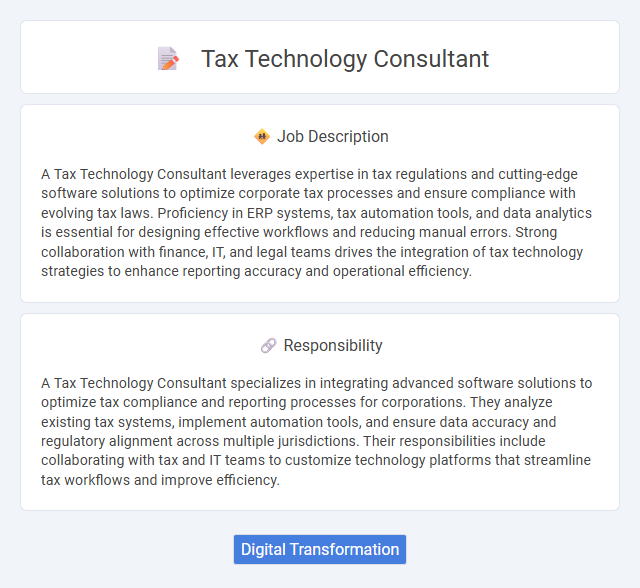
A Tax Technology Consultant leverages expertise in tax regulations and cutting-edge software solutions to optimize corporate tax processes and ensure compliance with evolving tax laws. Proficiency in ERP systems, tax automation tools, and data analytics is essential for designing effective workflows and reducing manual errors. Strong collaboration with finance, IT, and legal teams drives the integration of tax technology strategies to enhance reporting accuracy and operational efficiency.
Individuals with strong analytical skills and a passion for technology are likely to find the role of a Tax Technology Consultant suitable. Those comfortable navigating complex tax regulations and adapting to evolving software systems may thrive in this position. People who prefer dynamic problem-solving environments and continuous learning might have a higher probability of success in this career.
Qualification
Tax Technology Consultants require strong expertise in tax regulations, advanced proficiency in tax software such as SAP, Oracle, or Alteryx, and experience in data analytics to optimize tax processes. A background in accounting, finance, or computer science, often coupled with certifications like CPA or CFA, enhances qualifications for interpreting complex tax data. Exceptional problem-solving skills and knowledge of automation tools empower these consultants to improve compliance accuracy and streamline tax reporting systems.
Responsibility
A Tax Technology Consultant specializes in integrating advanced software solutions to optimize tax compliance and reporting processes for corporations. They analyze existing tax systems, implement automation tools, and ensure data accuracy and regulatory alignment across multiple jurisdictions. Their responsibilities include collaborating with tax and IT teams to customize technology platforms that streamline tax workflows and improve efficiency.
Benefit
Tax Technology Consultants likely enhance compliance accuracy and efficiency by leveraging advanced software tools and automation. They may reduce the risk of errors and audits, leading to significant cost savings for businesses. Improved data analysis capabilities probably support better decision-making and strategic tax planning.
Challenge
Tax Technology Consultant roles likely involve navigating complex regulatory changes while integrating advanced software solutions to streamline compliance processes. The challenge probably centers on balancing technical expertise with evolving tax laws to ensure accurate reporting and risk management. Adapting quickly to new technologies and maintaining data security could further complicate the position.
Career Advancement
A Tax Technology Consultant leverages expertise in tax regulations and advanced software solutions to optimize compliance and reporting processes for clients. Mastery in tools like SAP Tax, Oracle Tax Reporting, and emerging AI-driven tax technologies drives significant efficiency improvements and positions professionals for leadership roles. Continuous skill development in data analytics, regulatory updates, and automation frameworks accelerates career growth toward senior consultancy and strategic advisory positions.
Key Terms
Digital Transformation
Tax Technology Consultants drive digital transformation by integrating advanced software and automation tools within tax operations, enhancing accuracy and efficiency. They leverage AI, data analytics, and cloud platforms to streamline compliance and reporting processes, reducing manual effort and risk. Their expertise enables organizations to adopt scalable, technology-driven tax solutions aligned with evolving regulatory landscapes.
 kuljobs.com
kuljobs.com